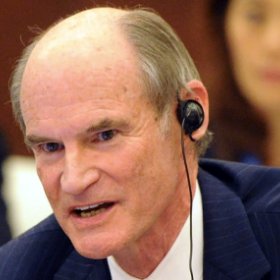
When Does A Cyber Attack Mean War?
Bruce McConnell, who oversees the institute's Global Cooperation in Cyberspace Initiative, talks to The Center for Investigative Reporting's Reveal about global rules in cyberspace.
In 1996, the U.S. and Russia began meeting in secret to establish a set of common protocols for their respective operations in cyberspace. Since then, they’ve managed to agree, via the United Nations, that international law applies in the digital realm—and that countries must take responsibility for the actions of hackers operating within their borders. As recently as 2015, the two parties also agreed that no state should use digital tools to target each other’s critical infrastructure during peacetime.
But the common ground essentially ends there. While Russia historically has pushed for treaties that limit the use of digital weapons, the U.S. for years has claimed that cooperation among international police is a better technique for regulating cyberspace.
Throughout this standoff, both sides have taken shots at the other’s approach: U.S. critics say any treaty Russia creates would limit free speech by targeting citizens who find a way around the country’s censorship infrastructure; Russia maintains that America, in refusing to come to the table, is willfully stoking a digital arms race.
The latter assessment is not so far off, according to some experts.
“Of all countries, the U.S. has the fewest incentives to reach any binding agreements about the limitations of use of cyber weapons,” said Bruce McConnell, a former deputy undersecretary for cybersecurity at the Department of Homeland Security in the Obama administration. “When you have asymmetry in the world, as we still do, there’s less incentive in the most powerful superpower to put something on the table that says we won’t use this capability.”
Yet even as the U.S. has developed and refined its cyber arsenal, its deep reliance on information technology has made it among the world’s most alluring targets for hackers, McConnell said.
Click here to read the full story on Reveal.

